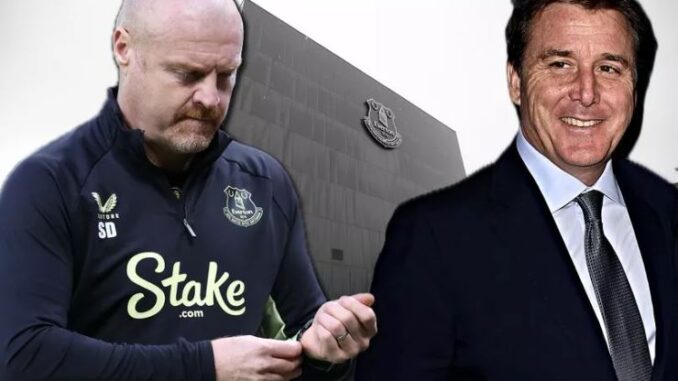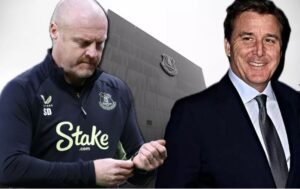
Sean Dyche has saved Everton twice. Now the club has to work out whether it wants to save him – and, indeed, whether it even can.
Something needs to change. That much is clear. Three wins have been achieved in half a season. Everton have failed to score in eight of the past 10 games. After going 81 minutes
without a shot on goal against Nottingham Forest, they did not have one against Bournemouth. That game was already lost by that point.
In the meantime, Everton’s rivals have rallied. Just a fortnight ago, new owners The Friedkin Group watched a gutsy and deserved draw against Chelsea, the first game of the new
era they will deliver on Merseyside. The result was the climax of an impressive streak of stubbornness as Everton’s side embodied the best attributes of the Dyche premiership to
earn valuable points against Arsenal, Manchester City and Chelsea.

Yet those results, though significant, did not move the dial. And their lustre has now diminished. Since that goalless draw against Chelsea, Crystal Palace have matched the result
as part of a surge that has taken them four points clear of Everton. Ipswich Town bettered it with a heartening win and would have overtaken Everton at the weekend had it not
been for a stoppage time penalty at Fulham.
The beginning of a year that holds so much promise for Everton started with Blues cheering from their living rooms at the misfortune of a newly-promoted side falling
agonisingly short of victory in west London. Wolverhampton Wanderers, another of the strugglers, were humiliated at Goodison Park one month ago but that defeat helped to
liberate them. A new manager soon followed. Vitor Pereira has inspired Wolves to seven points and seven goals in his three games in charge. They are upwardly mobile.
Southampton and Leicester City still look bereft of ideas and both are cautionary tales that a change in the dugout does not guarantee a change in fortunes. As woeful as Leicester
have been, they are still just three points from Everton though.
The message of recent weeks has been clear. There can be no salvation in hoping there are simply three clubs worse than Everton – that the club will survive by default. Everton
must be proactive if they are to prevent catastrophe – the club must act if it wants the chance to control its own destiny.
What happens next is the big question. Relieving Dyche of his duties is one option, though it carries risk with it. The Blues boss has cut a frustrated figure after recent weeks and
some of his comments have been as confusing as his efforts to find a breakthrough in form.
Dyche continues to rail against the circumstances and squad he inherited. He has every right to do so, having navigated remarkable hurdles to ensure Everton still represented a
project former owner Farhad Moshiri was able to sell and TFG believed to be worth investigating in. Whatever happens next, should Everton come to realise a brighter future
under new ownership then the significance of Dyche’s role in helping the club survive to better days will only grow in prominence. History will likely be kinder to Dyche than the
present is.
The present is tough, however. Results have been poor, the past two displays have been stale and both were followed by Dyche suggesting his players had not started as he wished
them to. Off the pitch, he has not helped himself with claims such as those made to the ECHO on Saturday, when he again suggested there was a false belief Everton would
improve because “it is the last season in the Old Lady”. Such comments represent a failure to identify with the hopes of loyal supporters who know more than any how tough
recent times have been and are fully justified in wanting more from the final season at Goodison than watching the supporters of Brighton and Hove Albion, Bournemouth,
Southampton and Brentford celebrate in the away end.
There is no escape from the reality that his side is struggling right now and it is unclear how he can change that, though he must if he and Everton are to have a chance of moving
forward together. He chafes at the idea of bringing in outside coaching help. Unlike at the start of the season, he cannot point to injuries. Unlike for the 23 of his near 24 months
in charge, he cannot point to instability above him. This is a side lacking in ideas and inspiration and, should he be given the chance, he needs to change that and for his ideas to
extend beyond those employed on the south coast. No-one expected the introduction of Harrison Armstrong and Nathan Patterson but turning to a 17-year-old with huge
promise but little experience to galvanise the attack from the middle and opting to use attack-minded Patterson to cover for 39-year-old Ashley Young moving to the wing had the
hallmarks of a Hail Mary – even more so with Jack Harrison, low on confidence but high on experience and who has succeeded in both attacking midfield and on the right wing
under Dyche – remaining in his tracksuit as an unused substitute.
Dyche inherited a mess and is not shy at pointing that out, as he did again after the final whistle at the Vitality Stadium. But he must acknowledge his own responsibility in the
continued struggles going forward having been at the club as long as he has. It was not all bad when he arrived at Goodison Park, either. Jordan Pickford was present at Finch
Farm and for all that Everton’s defensive record has been impressive across recent months, it has required England’s number one to sustain incredible form to protect it. Clean
sheets against West Ham United, Brentford, Chelsea, Arsenal and Newcastle United were only possible because of his individual brilliance.
Dyche was immediately handed the initial backing of the Friedkins upon their arrival on Merseyside. There is little doubt the preference would be to keep him in post until the
end of the season. That is a perfectly reasonable approach for many reasons.
Should the panic inspired by the current situation lead to a change then the Friedkins would have two options. They would either need a caretaker, a temporary firefighter to lead
the team to safety, or fast-track the appointment of someone they want to oversee the Everton of the future. If it is the former then Dyche could argue there is none better for this
situation than him. It might not be pretty but he has done it twice already and is well-versed in the circumstances of the club.
For all that Everton have the opportunity to change personality and culture in the summer, right now only the name above the door to Goodison and on the cheques written on
behalf of the club have changed – everything else, as Dyche accurately said after Bournemouth – is the same, including his limited squad. While the final season at Goodison may
finish as it began, with displays and results that need to be tolerated rather than enjoyed, Dyche has a history of delivering ‘enough’ and even though his team has struggled to
score over the past month, and been reliant on Pickford, it would be harsh in the extreme not to give Dyche credit for the resilience, solidity and fight that was on show before
Everton faltered either side of the new year.
Yet his future is in doubt because, despite that, Everton still face immediate peril. That danger could shield him. If a caretaker is not deemed appropriate then the alternative is
the installation of a manager the Friedkins identify as being the person they wish to lead the Everton project they want to begin in the summer, when the club has a new home,
new financial freedom and an opportunity to transform the playing squad. That challenge is a completely different one to the heat of an immediate relegation battle with the
current squad though, and the danger would be that, if the manager for the future gets off to a bad start, the project could end before it has begun.
There are other reasons to back Dyche in the short term. The full extent of Everton’s position in relation to Profit and Sustainability Regulations for the year the club is currently
in, 2024/25 is unclear. The club is expecting to come through the 23/24 PSR checks, currently underway, unscathed after the sales of Ben Godfrey and Lewis Dobbin in June, and
there is no current fear of a breach this year either – Dyche himself repeatedly stating that over recent weeks. Yet he has also been clear that, while Everton now have the money to
fund significant business, PSR is likely to constrain the club this month with June 30, the end of the football financial year, expected to be the watershed moment from which
Everton can spend to transform their squad.
If PSR is limiting efforts to boost a flagging squad then it also offers a hurdle to a change in the dugout. Not only would compensation to Dyche and his staff impact the figures,
any money needed to smooth the way for a deal with a manager currently in work would also come under scrutiny. It may be that the accounts suggest what wriggle room is
available to Everton can fund either a managerial change or a new signing, but not both.
If it is to be the latter then that provides another source of intrigue. After Bournemouth, Dyche again questioned the belief Everton were set for a promising season that he thinks
permeated expectations at the start of the season. It is not clear who Dyche attributes those hopes to – most supporters appeared aware this campaign would contain challenges
but expectation rarely surpassed this being a year of stability in which a mid-table finish would prevent the need for anxiety come the spring.
Given that he guided Everton to a point total that, had the points deductions not been made, would have placed them in 12th place the previous season, Dyche bore some of the
positive credit for that. Given how well he performed the previous season, there were larger expectations for this one. Furthermore, even if there was no change in the transfer
policy during the summer, the inclusion of players like Iliman Ndiaye, Jesper Lindstrom, and Armando Broja strengthened his attacking options, thus it was reasonable to believe
that this Everton team would be more formidable in the future. Amadou Onana’s departure was a major loss of skill among the departing players, but his omission from the
starting lineup during the run that sealed survival in April demonstrated that he was not a key component of Dyche’s strategy.
Read more news:https://sportupdates.co.uk/

Leave a Reply